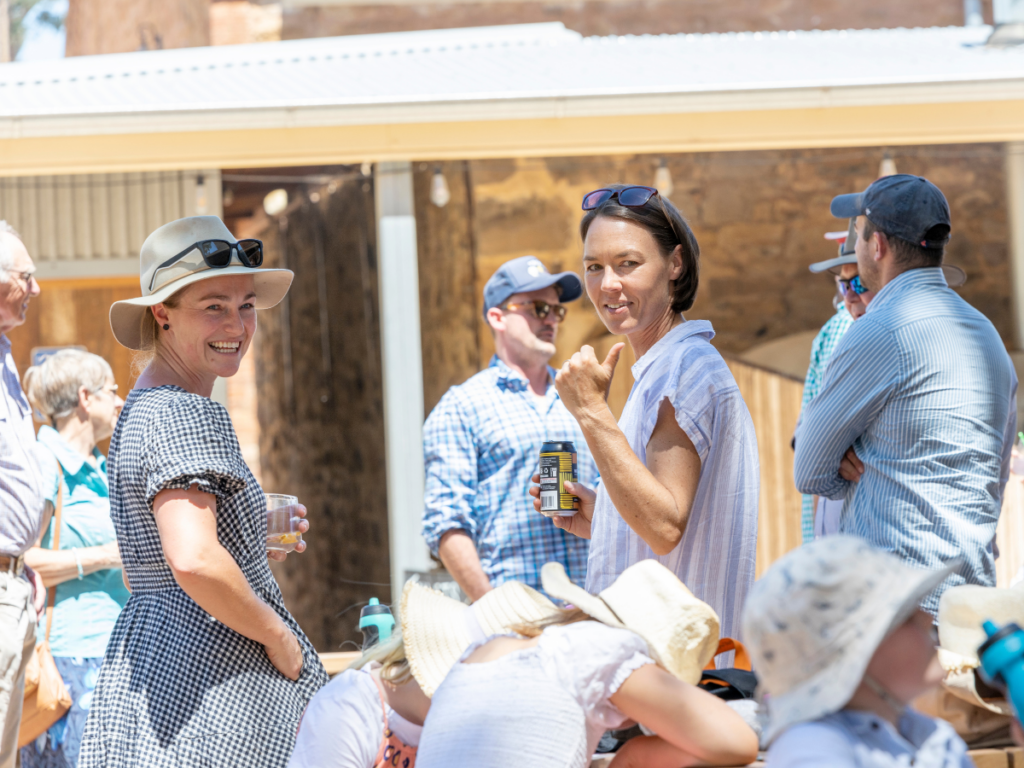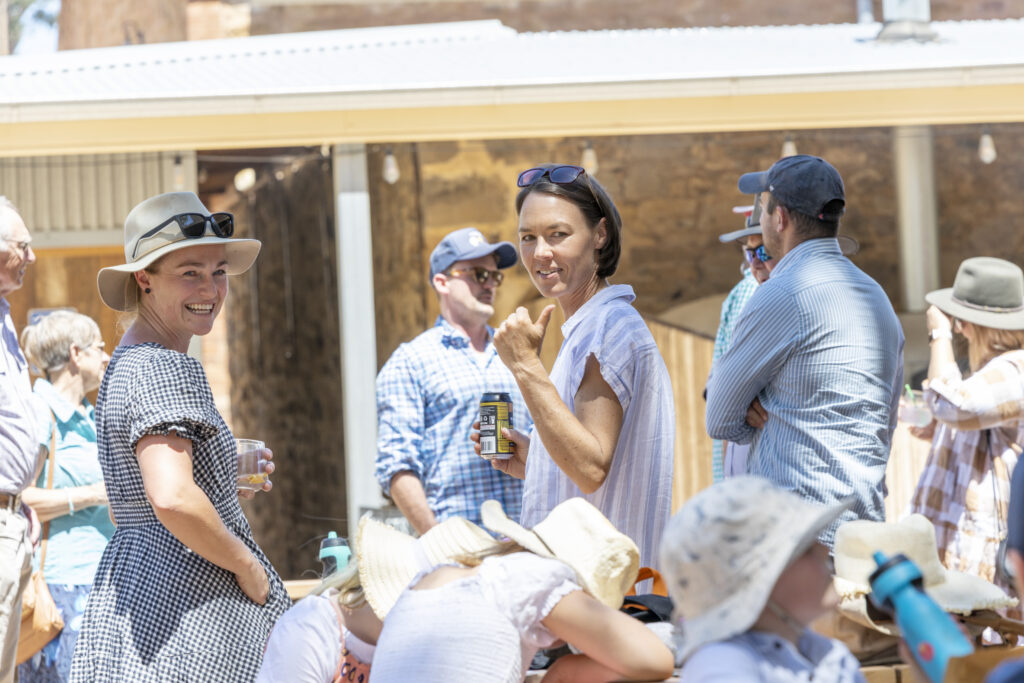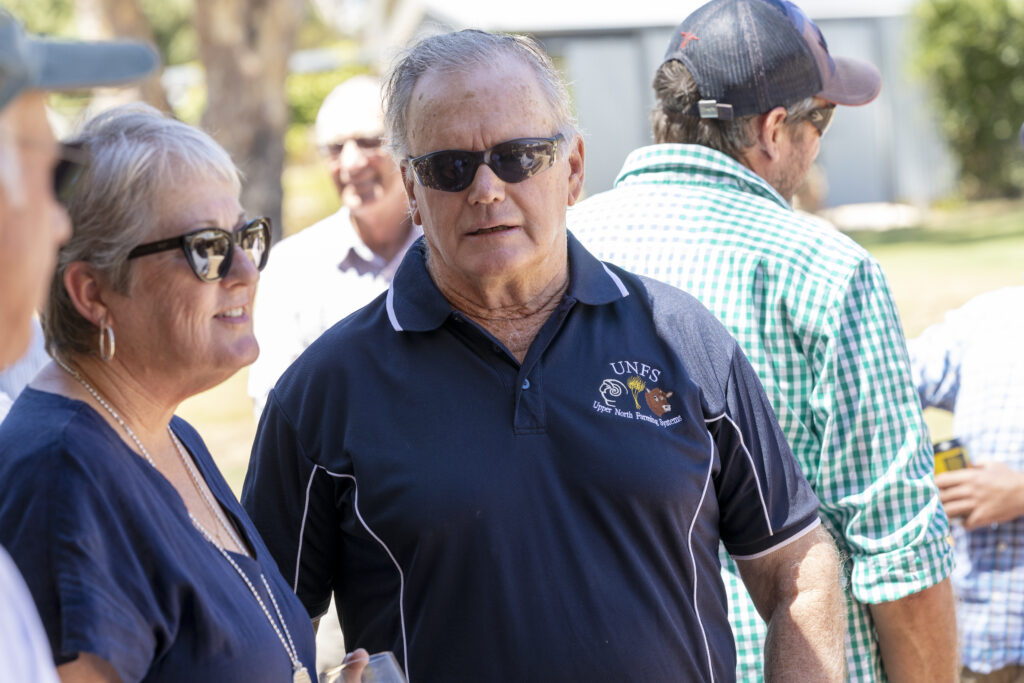Foundation for Rural & Regional Renewal (FRRR)
Upper North Farming Systems’ (UNSF’s) mission is to facilitate capacity building and empowerment of the agricultural community across the upper north region of South Australia. The group focuses on adapting and connecting farmers so they can learn from each other and from their shared experiences, and not farm in isolation. They do this by bringing farmers together in what they call Hubs. It’s a large and diverse geographical area, encompassing Booleroo Centre, Crystal Brook, Hallet, Jamestown, Laura, Peterborough, Nelshaby, Orroroo, Quorn and Wilmington. It’s a harsh climate, and when times are tough, they are very tough. The region has experienced significant declines in population and services over the past 30 years and the social fabric of communities in many areas has become frayed.
With the majority of communities in the region still reliant on agriculture, the social toll of the latest drought – the longest dry on record in 2020/21 – was evident, with symptoms of volunteer burn-out, self-isolation and mental health related issues.
Farmers know technology is essential, and farming systems have evolved significantly since the previous major drought, with stubble retention, improved efficiency of water use and a better understanding of livestock nutrition.
These communities are adaptable, open to innovation and aided through programs that promote not only professional connection, but also social and community connections, especially as these areas are typically not well-serviced by government research bodies and private consultants.
There are currently 11 Hubs under UNFS – eight geographical Hubs: Booleroo / Appila, Morchard / Orroroo / Pekina / Black Rock, Melrose, Gladstone / Laura, Jamestown, Nelshaby, Quorn and Wilmington and three non-geographic Hubs: Ladies on the Land, New Farmers and the Ag Tech Hub. The establishment of the Hubs in 2019 recognised the need to retain networks within the group and foster the tackling of issues on a smaller scale, as well as the importance of coming together on a social level.
A $20,000 Networks to Build Drought Resilience grant enabled UNFS to deliver the ‘Tools, Tech and Transformation’ workshop for farmers and agribusinesses. The key event was followed by a series of nine Hub events to provide the opportunity for networking, info-sharing, and learning about new farming systems and techniques to improve drought resilience. A ‘farmer-to-farmer’ learning model was recognised as a valuable and efficient mechanism to improve the productivity, profitability and sustainability of the agricultural industry in low rainfall zones.
The project reached 205 participants across 10 events that spanned six sector networks (Farm Business, Research Institute, NFP’s / Community Organisations, Consultants, Off Farm Business, Government Agency). Targeting farmers and agri-business directly, attendees learnt about tools aimed at improving efficiencies, sustainability and outcomes of operations like automatic feeding, as well as technology evolutions and business systems like satellite imagery on the farm scale, and succession and transition planning. Importantly, the solutions offered were all commercially available to be adopted on-farm, and farmers were able to speak directly with professionals in the fields, with discussions encouraged. They left with upto-date knowledge to help them build more resilient farming systems.
The Hub events ensured accessibility for farmers who couldn’t afford too much time away from their land. They were able to talk with neighbours and researchers about the outcomes of the 2021 season and what they might be able to do better next time. Questions like when and how to de-stock, how to ensure you’re looking after genetics and bloodlines, and considerations around agisting, planting times, and upgrading tech vs repairing machinery were raised. Each Hub session included a training session in a tool, tech or system (identified from the key event by their elected Hub Representative), as well as a planning session identifying how to implement the new skills and knowledge on-farm, and where they require additional support.
Through the project, participants built knowledge and understanding of the risks posed by drought and climate change and learnt new concepts on a range of topics that can be adapted for drought and climate preparedness.
Communities had the opportunity to connect, train, converse (something many would not normally do in their usual day-to-day business) and lean on systems and each other so they are more prepared for future challenges
Upper North Farming Systems’ (UNSF’s) mission is to facilitate capacity building and empowerment of the agricultural community across the upper north region of South Australia. The group focuses on adapting and connecting farmers so they can learn from each other and from their shared experiences, and not farm in isolation. They do this by bringing farmers together in what they call Hubs. It’s a large and diverse geographical area, encompassing Booleroo Centre, Crystal Brook, Hallet, Jamestown, Laura, Peterborough, Nelshaby, Orroroo, Quorn and Wilmington. It’s a harsh climate, and when times are tough, they are very tough. The region has experienced significant declines in population and services over the past 30 years and the social fabric of communities in many areas has become frayed.

With the majority of communities in the region still reliant on agriculture, the social toll of the latest drought – the longest dry on record in 2020/21 – was evident, with symptoms of volunteer burn-out, self-isolation and mental health related issues.
Farmers know technology is essential, and farming systems have evolved significantly since the previous major drought, with stubble retention, improved efficiency of water use and a better understanding of livestock nutrition.
These communities are adaptable, open to innovation and aided through programs that promote not only professional connection, but also social and community connections, especially as these areas are typically not well-serviced by government research bodies and private consultants.
There are currently 11 Hubs under UNFS – eight geographical Hubs: Booleroo / Appila, Morchard / Orroroo / Pekina / Black Rock, Melrose, Gladstone / Laura, Jamestown, Nelshaby, Quorn and Wilmington and three non-geographic Hubs: Ladies on the Land, New Farmers and the Ag Tech Hub. The establishment of the Hubs in 2019 recognised the need to retain networks within the group and foster the tackling of issues on a smaller scale, as well as the importance of coming together on a social level.
A $20,000 Networks to Build Drought Resilience grant enabled UNFS to deliver the ‘Tools, Tech and Transformation’ workshop for farmers and agribusinesses. The key event was followed by a series of nine Hub events to provide the opportunity for networking, info-sharing, and learning about new farming systems and techniques to improve drought resilience. A ‘farmer-to-farmer’ learning model was recognised as a valuable and efficient mechanism to improve the productivity, profitability and sustainability of the agricultural industry in low rainfall zones.
“Through the Tools, Technology and Transformation event series, farmers and landholders have been provided with an abundance of information that can be adapted and changed on farm. Therefore, these tools that have been taken from the events can help farmers change their way of thinking and help their preparedness for drought or any other climate challenges they may face.”
The project reached 205 participants across 10 events that spanned six sector networks (Farm Business, Research Institute, NFP’s / Community Organisations, Consultants, Off Farm Business, Government Agency). Targeting farmers and agri-business directly, attendees learnt about tools aimed at improving efficiencies, sustainability and outcomes of operations like automatic feeding, as well as technology evolutions and business systems like satellite imagery on the farm scale, and succession and transition planning. Importantly, the solutions offered were all commercially available to be adopted on-farm, and farmers were able to speak directly with professionals in the fields, with discussions encouraged. They left with up-to-date knowledge to help them build more resilient farming systems.
The Hub events ensured accessibility for farmers who couldn’t afford too much time away from their land. They were able to talk with neighbours and researchers about the outcomes of the 2021 season and what they might be able to do better next time. Questions like when and how to de-stock, how to ensure you’re looking after genetics and bloodlines, and considerations around agisting, planting times, and upgrading tech vs repairing machinery were raised. Each Hub session included a training session in a tool, tech or system (identified from the key event by their elected Hub Representative), as well as a planning session identifying how to implement the new skills and knowledge on-farm, and where they require additional support.
Through the project, participants built knowledge and understanding of the risks posed by drought and climate change and learnt new concepts on a range of topics that can be adapted for drought and climate preparedness.
Communities had the opportunity to connect, train, converse (something many would not normally do in their usual day-to-day business) and lean on systems and each other so they are more prepared for future challenges.



